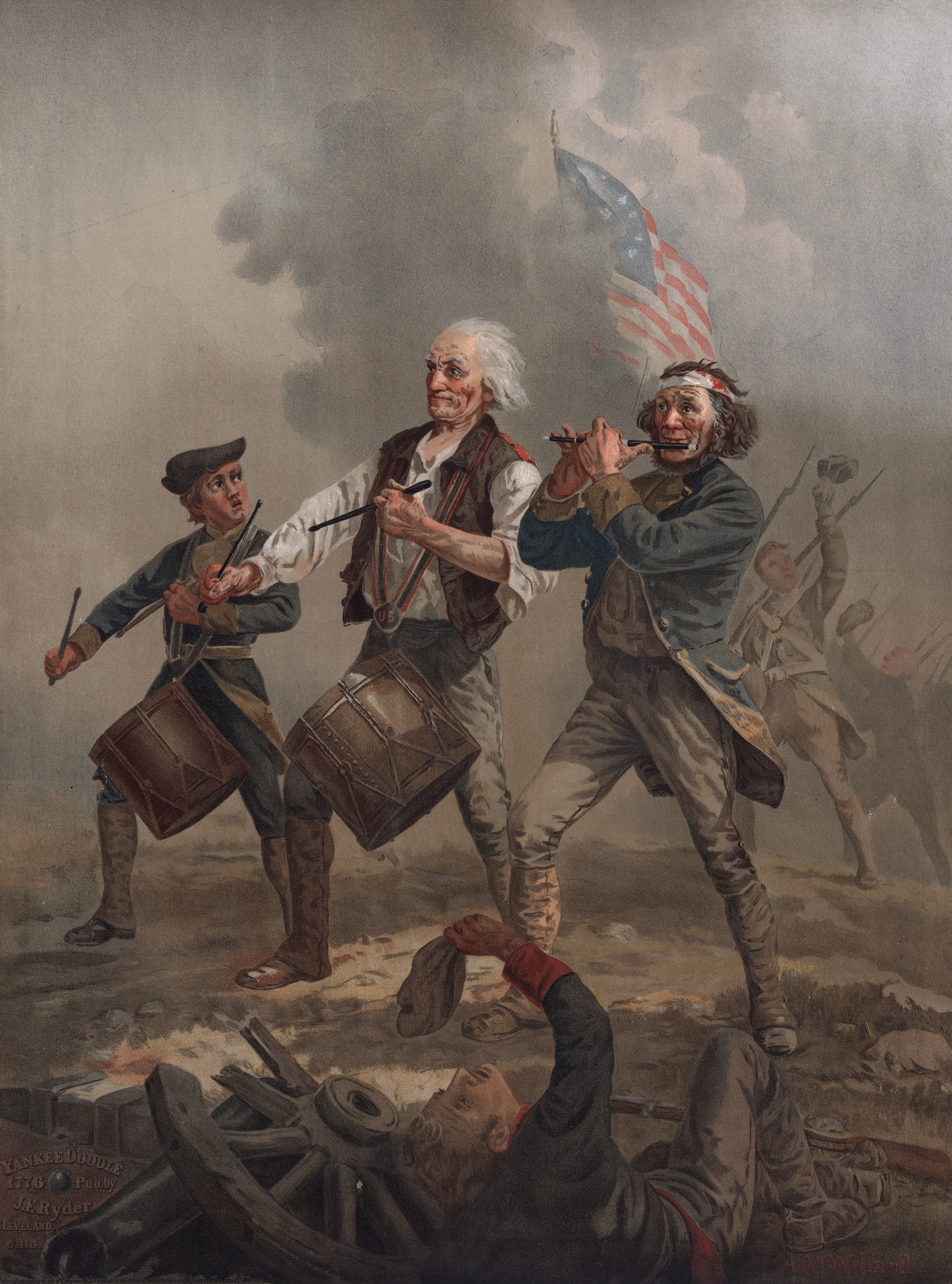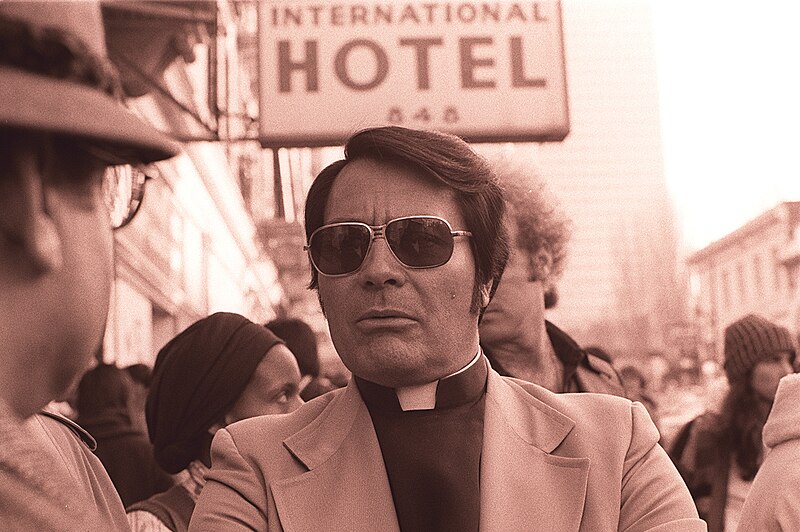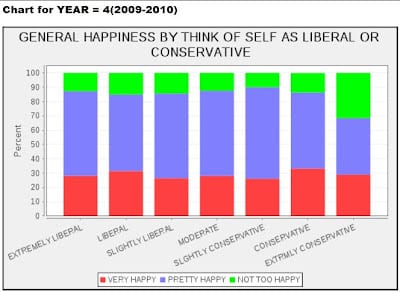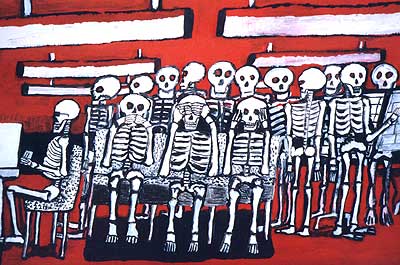 |
| The Spirit of '76, A.M. Willard |
While looking back over some of my older posts (I'm considering using my currently unemployed status as an opportunity to publish my writings into something of a book), I came across
an entry on the tendency of social spending to go to people not in our personal community, and thus "out of sight, out of mind". I was reminded of how this is a perennial problem for progressivism, as not only must we make a case for the efficacy of these programs, but so too their moral necessity. The merits of government action have a moral claim when they are felt to be worthwhile endeavors. And they are worthwhile if they are providing a valued service. We can all appreciate the services we experience directly, or can easily imagine to be necessary. Roads, police, parks, libraries, etc. are all things that we can personally take advantage of. A national defense, while more abstract, can at least be imagined to be important to the safety of ourselves and loved ones. Yet what about a moral case for services that we will never imagine needing?
A moral appeal requires showing that the recipients of such social spending, the beneficiaries of our larger social largess, are themselves worthy. Yet because of economic and social segregation, these are often people who are not a direct part of our communities. To the progressive mind, ever conscious of inequality and social injustice in society, it is easy to imagine their plight, even if we do not live in their community. We see a causal connection between a child raised in poverty and his likelihood of lack of success in adulthood, and argue that this is a social problem that requires intervention.
However, the conservative mind is much more likely to believe that it is the responsibility of the poor family to help themselves, and that it is not the moral responsibility of society to help. Further, doing so would probably make things worse, either by wasting tax dollars better spent on growing the economy, or by creating a moral hazard problem in which the aspirations of the poor are dimmed and a culture of "entitlement" sets in.
Although as a progressive I am already biased against the conservative outlook, in my career working with the poor and needy, I have found little evidence to support conservative claims. Indeed, have found them not only to be genuinely disadvantaged, but generally in situations in which but for government or private charity, their circumstances would be much more dire. Neither have I found much evidence that a "culture of entitlement" has arisen because of social largess, primarily any such culture is the product of vastly larger forces at work than any pittance of social services on offer. An individual with healthy levels of human and societal capital is not going to give up all personal ambition and choose a life of poverty for the chance to acquire free food stamps, child care, or a disability check. While many individuals exist who no doubt could find more personal success would they just apply themselves, and instead rely heavily on government aid, they represent a very small portion of recipients, and in the absence of aid would still lack the human and societal capital to make much of themselves regardless. Properly designed social programs are structured in such a way as to promote individual agency, rather than retard it.
But how to make this moral case to those who would not naturally align themselves with the poor and downtrodden, and who will rarely if ever directly experience their struggles? Conservatism has become (to what extent it has always been, I can only guess) enraptured with the idea of government as a sort of personal market. Instead of an institution that promotes the welfare and well-being of all, it is thought of as an institution that ought only promote the welfare of oneself. Thus, the question becomes not "what is society getting out of government", but "what am
I getting out of government"?
The model shifts from one of social insurance and shared sacrifice, to a personal, transactional ledger of goods and services rendered. No better example of this exists in the movement towards vouchers and charter schools. The question is posed as what is an individual getting for their tax dollars, as opposed to what is society getting? Public schools have always been socialist in the sense that they are a provision of the government, guaranteed to all children, designed to maximize the social welfare of all. Private schools, by contrast, operate in private, for the sole benefit of the individual, and without concern for the welfare of anyone else. This is why we do not fund private schools with public funds - their purpose is expressly at odds with the mission of public governance. If one spends public monies on private schooling, one might as well return all taxes and allow individuals to purchase parks, libraries, roads, police, etc.
The absurdity of this logic rests in the fact that public spending is fundamentally based on a principle of social good, and the redistribution of what you might call
social risk. For instance, many people do not have children, yet agree to pay taxes so that other people's children are guaranteed an education, or so would theirs should they find themselves with young of their own - the risk being that any child should lack a proper education. Likewise we all pay taxes for services that we do not directly consume, such as the paving of a street across town. Yet we agree to such services in order to avoid the risk that any of us not have a paved road, or that should we drive down that road, it be paved for us as well.
This - the sharing of risk and mutual responsibility for fellow man - is a basic premise not only of democracy but of civilization going back millenium. Even kings were obligated to provide for their people, lest the people become too dissatisfied and organize a rebellion. The notion of democracy comes in when the people, not a king, demand to control how this risk is managed. For sure, the American revolution was fought expressly over the idea that taxes were being collected to pay for risks over which the people were given no claim of ownership.
Which is as good a place as any to bring up the Tea Party, a conservative movement founded in part with the Revolutionary notion in mind that taxes ought to be used fairly. Yet to these conservatives, decked out in Revolutionary garb as they often are, the issue is not that the people are not being given say in how risk is managed (after all, the social spending they decry is passed legally, by elected representatives), but that
they are be forced to risks which they do not approve of. While the progressive sees the an injustice in the disadvantaged not receiving help from a society that has a moral responsibility to help them, to manage their their risk, the conservative Tea Partier sees an injustice in having to be held personally responsible for that social risk. To him, driven by such long-standing distrust and anger at the government, the idea of social risk itself has increasingly been called into question. In coming to view the government not as an institution entrusted to provide for the greater good, but rather as an institution unfairly taking from him and giving to others, he has come to question the very notion of social good itself.


.jpg/800px-%E8%84%B1%E3%81%8E%E3%83%96%E3%83%BC%E3%83%84_(2894188205).jpg)














